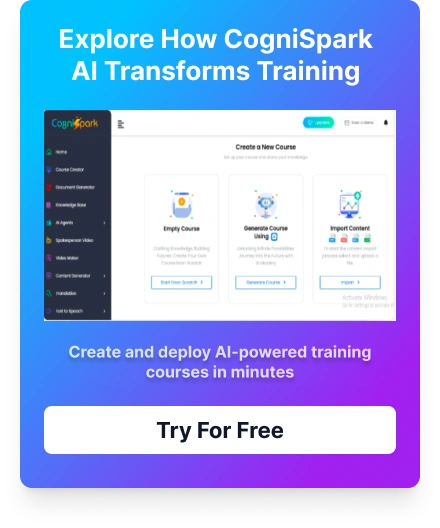Expanding eLearning courses to global audiences requires effective translation that goes beyond simply converting text from one language to another. AI-driven translation tools ensure content remains consistent, aligned with your brand voice, and tailored to specific locales.
Here’s how AI achieves this:
1. Ensures Consistency Across All Content
AI translation tools are designed to maintain uniformity across multiple courses, modules, and platforms. By leveraging translation memory and glossaries, AI ensures that recurring terms and phrases are translated consistently.
Benefits:
- Eliminates discrepancies in terminology across modules.
- Saves time by reusing previously translated phrases.
- Maintains uniformity in tone and style, crucial for branding.
For example, AI tools store frequently used phrases in a database, ensuring consistency even when multiple translators or teams are involved in the project. This means learners across different geographies can access uniform content that resonates with the original intent.
2. Preserves Brand Voice and Style
Maintaining your brand’s unique voice across languages is vital to creating a cohesive learning experience. AI tools use natural language processing (NLP) algorithms to adapt translations to your specific tone and style guidelines.
Benefits:
- Keeps translations aligned with corporate messaging.
- Avoids misinterpretation of brand-specific terms.
- Customizes translations to fit the context of your industry and audience.
AI’s ability to adapt to brand-specific rules ensures learners worldwide receive a unified message that resonates with the original intent. For instance, phrases commonly used in marketing or instructional design can be adapted without losing their impact, ensuring that learners feel a seamless connection to the brand.
3. Adapts Content to Local Cultures
Localization goes beyond translation by incorporating cultural nuances, regional idioms, and local preferences. AI localization tools analyze cultural contexts to make eLearning content relatable and engaging for diverse audiences.
Benefits:
- Enhances learner engagement with culturally relevant content.
- Avoids missteps caused by literal translations that lack context.
- Supports multilingual delivery with accurate voiceovers and subtitles.
For example, a training module created for a global audience can be localized to include region-specific examples or case studies, ensuring learners find the content relatable. AI tools can even suggest adjustments to visual elements, such as using culturally appropriate imagery and color schemes.
4. Speeds Up Translation and Localization Processes
Traditional translation methods are often slow and resource-intensive. AI tools accelerate the process without sacrificing quality, using machine learning to quickly produce accurate results.
Benefits:
- Reduces time-to-market for multilingual courses.
- Minimizes manual effort with automated workflows.
- Scales easily for large volumes of content.
AI translation tools can handle simultaneous translations into multiple languages, making them ideal for large-scale eLearning projects. Additionally, automated workflows reduce the chances of errors introduced by manual processes, ensuring that content delivery timelines are met without compromise.
5. Improves Accessibility for Global Audiences
AI not only translates content but also makes it accessible to diverse audiences by offering features like multilingual subtitles, text-to-speech options, and adaptive learning paths.
Benefits:
- Enables learners with varying language proficiencies to access content.
- Supports accessibility features, such as closed captions for videos.
- Promotes inclusivity by adapting content for different learning needs.
This means that learners from non-native language backgrounds or those with specific accessibility requirements can benefit equally from your courses, making your eLearning truly global.
Why Choose AI for eLearning Translation?
AI offers unmatched efficiency and accuracy for eLearning translation, ensuring that your courses are not only well-translated but also culturally and contextually relevant. Key advantages include:
- Cost-effectiveness: Reduces dependency on human translators for repetitive tasks.
- Scalability: Handles projects of any size, from small modules to comprehensive programs.
- Real-time Adaptation: Continuously learns and improves through machine learning algorithms.
Conclusion
AI-driven eLearning translation tools are transforming the way global learning content is created and delivered. By ensuring consistency, preserving brand voice, adapting content to local cultures, and enhancing accessibility, AI simplifies the complex process of multilingual eLearning. Whether you’re expanding your courses to new markets or enhancing accessibility, AI ensures your content remains impactful, on-brand, and globally relevant.
Ready to simplify your eLearning translation process? Discover how Cognispark AI can help you deliver consistent and localized courses faster. Explore the possibilities today!






















